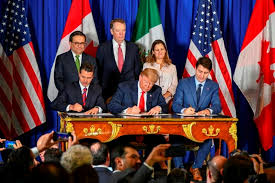Meltdowns and touchdowns: How the U.S. scored a Canada-Mexico trade deal

Revising the U.S.-Mexico-Canada trade agreement took a year of acrimonious talks among Democrats, the chief U.S. negotiator and a labor union president – and may have set a world record for phones being slammed down in anger, according to one negotiator.
On Tuesday top officials from Canada, Mexico and the United States signed the overhaul of the 1994 North American Free Trade Agreement (NAFTA) after House of Representatives Democrats won significant changes to the original text.
The hard-won deal for the new U.S.-Mexico-Canada Agreement (USMCA) followed an intense weekend of negotiations that took place in person in Washington and by telephone, including with AFL-CIO union leader Richard Trumka, otherwise engaged on a hunting trip.
“These were intense, argumentative, angry negotiations. I mean this got really hot on a number of occasions,” House Ways and Means Committee Chairman Richard Neal told reporters on Tuesday at a post-deal briefing attended by key legislators in the talks.
“I think we set a world record for hanging up on each other, myself and the trade rep,” Neal said, referring to conversations with U.S. Trade Representative Robert Lighthizer. “But at the same time, we also knew this was an opportunity that we couldn’t let get away from us.”
In the end, labor unions, industry groups, lawmakers and even environmental groups hailed the outcome as a marked improvement from both NAFTA and the initial version of USMCA.
Neal said he spent the better part of the weekend on the phone, first with Lighthizer, then repeatedly with House Speaker Nancy Pelosi, who said a deal was getting close.
Then, just as he was watching his beloved New England Patriots football team face off against the Kansas City Chiefs, with the Patriots driving toward a touchdown, the phone rang again.
“On Sunday, when (quarterback) Tom Brady was about to take it in, all of a sudden I looked at my phone and it said Pelosi for caller ID. Long wisdom tells me, ‘The hell with Brady, take the call,’” Neal said, to a peal of laughter from Pelosi and other lawmakers.
‘BRUTAL’
Congressional sources said the negotiations were often heated and agreement seemed a distant possibility for many months, though that was common for trade deal negotiations.
“It was quite brutal. I do not think people got along at all,” said one congressional source, who asked not to be identified given the sensitivity of the closed-door talks.
A second source said the House Democratic working group that negotiated with Lighthizer was often at odds internally over competing priorities and whether the deal was even worth fighting for.
“Any one of them could have blown this process up,” added David Skillman, a trade lawyer with Arnold and Porter, who previously worked for Representative Earl Blumenauer, chair of the House Ways and Means trade sub-committee that worked on the deal.
Skillman said Pelosi’s creation of the ad hoc committee allowed her to bridge differences in the broader Democratic caucus.
Tim Keeler, former chief of staff in the U.S. Trade Representative’s Office and former Senate staffer, said the acrimony paid off in the end – a result that was by no means guaranteed.
“Any really tough negotiation is going to have ugly moments,” Keeler said. “It’s ugly sausage-making, but a pretty good outcome under the American system.”
